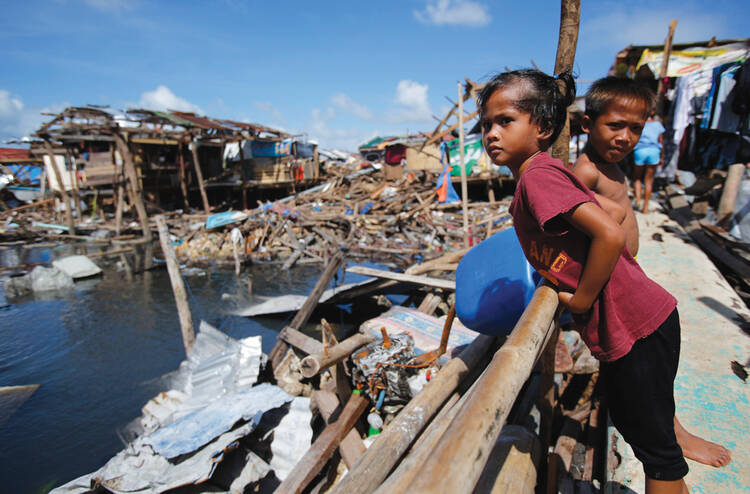Climate change represents an “ethical challenge to civilization,” said the Vatican’s lead representative to a U.N. conference reviewing the phenomenon’s worldwide impact. Archbishop Celestino Migliore said that the Vatican would help “form consciences and ethical perspectives” on climate change in line with Catholic social teaching and encourage “fairness, impartiality and mutual responsibility,” when it came to action to address the environmental threat.
As survivors in the Philippines continued to dig out from under the destruction of Typhoon Haiyan, Archbishop Migliore spoke at a conference hosted by Caritas Poland and Cardinal Stefan Wyszynski University in Warsaw, Poland. The event coincided with the Intergovernmental Conference of Parties of the U.N. Framework Convention on Climate Change, which also met in the Polish capital in mid-November. The conference brought together Catholic leaders, politicians, climate scientists and civil society groups, who called on governments to reduce their reliance on coal, oil and other fossil resources. The Warsaw Conference of Parties, meeting from Nov. 11 to 22, was called to review progress since the 1997 Kyoto Protocol on reducing greenhouse gas emissions.
“The crisis situation humanity currently faces has an economic, consumerist, environmental and social character but is also fundamentally moral,” Archbishop Migliore told the ecumenical conference. “If we accept that every person and community has the same right to use the atmosphere, then they also have the same duty to protect [it]. The scale of emissions must be proportionate to the size of population, emissions per capita and the level of [gross domestic product],” the archbishop said.
The World Health Organization estimates that climate change is already causing an additional 140,000 deaths annually. The World Bank reported on Nov. 18 that the costs of “more extreme weather related to a warming planet” were expected to grow, with developing countries “bearing the brunt” from floods, storms and droughts. The report said that annual economic losses had risen from $50 billion in the 1980s to almost $200 billion in the last decade, while the world had lost 2.5 million people because of climate-related natural disasters.
Jean-Pascal van Ypersele, vice chairman of the Intergovernmental Panel on Climate Change, said the panel’s evidence had been accepted by all governments and 97 percent of world scientists, adding that “clear evidence” suggested that Typhoon Haiyan, which wrecked the central Philippines on Nov. 8, was linked to climate change. Van Ypersele is professor of climatology and environmental sciences at the Catholic University of Louvain and advises bishops in Europe and Asia.
Representatives of Catholic development organizations arrived in Warsaw to lobby for action on climate change, and many also urged greater involvement by their own church. Some Catholic organizations have been active on the issue for years. In Peru, Catholic groups have promoted mitigation and adaptation strategies, as well as education and awareness on climate change, efforts that can arouse the ire of powerful mining, oil and forestry interests.
Fabian Simeon, an investigator with Forum Solidaridad Peru, thinks the Catholic Church should do more to offer protection to those who take a stand. “We’re running out of time,” said Simeon, whose country will host the U.N. Conference of Parties in 2014. “Although some priests and bishops are helping struggle for climate justice, their work faces strong resistance and often places them in danger.”
Outlining his hopes, the Rev. Frederick D’Souza, Caritas India’s executive director, said he believed championing “climate justice” should be viewed as a new expression of the Catholic Church’s option for the poor and should gain new impetus from Pope Francis’ advocacy of “modest lifestyles.”
“Churches must present a compassionate face to the world, showing how the poor are being further marginalized by climate change,” he said. “The Bible tells us we are stewards of the resources God has given us and must not allow them to be expropriated and misused.”








